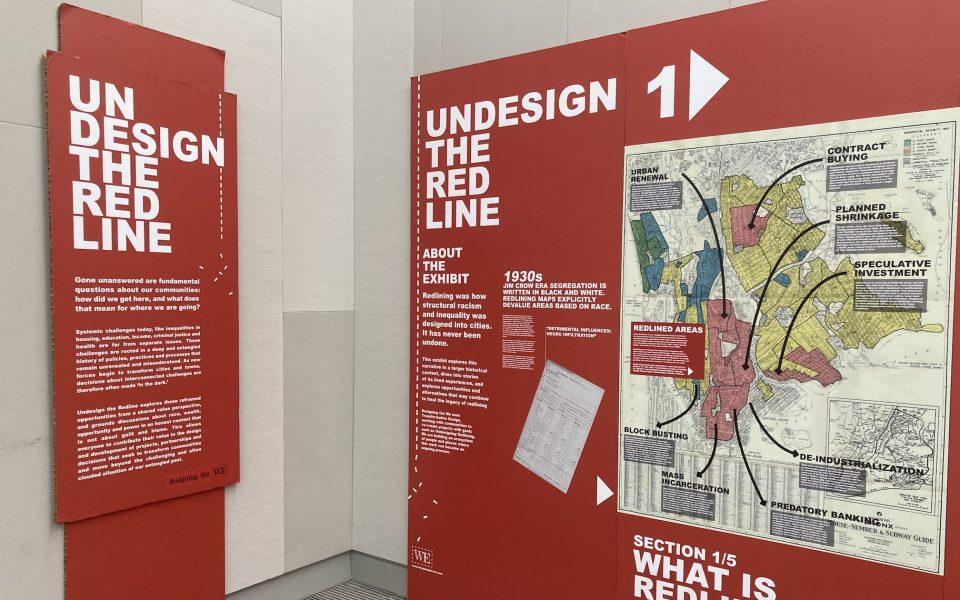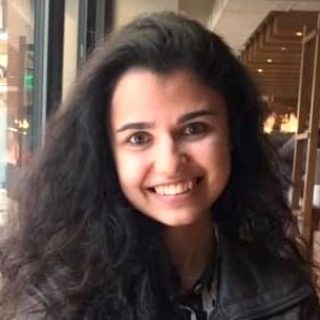Undesign the Redline is an exhibit at the Forsyth County Public Library, but the idea started all the way in Cleveland.
Brittney Gaspari, vice president of community investment at the Winston-Salem Foundation, saw the Cleveland exhibit in November 2019, when she was visiting the city for a work conference on inclusive economy. She resolved to bring something similar back to her community.
“It was a really profound experience,” said Gaspari. “The exhibit really helped me see how the history of a place or a country created outcomes we see today.”
Redlining is the denial of services to marginalized communities, such as financial services like bank loans, healthcare or access to food. Even retail businesses like supermarkets have been kept out of certain neighborhoods. Chicago activists coined the term in the 1960s, referring to the red lines bankers drew on their maps around communities they refused to work with.
A 2020 study by the National Community Reinvestment Coalition found that the majority of redlined neighborhoods in Winston-Salem are majority Black and have a lower life expectancy, lower estimated family income and higher risk of disease such as asthma or cancer.
Likewise, the USDA found that there are 21 food deserts in and around Winston-Salem, all in or around redlined cities. Cities that have never been redlined, largely white cities, have as many as 20 grocery stores easily accessible.
To bring the redlining exhibit to her city, Gaspari reached out to an organization called designing the WE, who were responsible for organizing the Cleveland exhibit.
“They give the broad, national context,” she said. “But some of [our exhibit] is really tailored to the community.”
One section of the exhibit, for example, offers documentation from Winston-Salem in the 1930s that shows how Black residents were discriminated against while another has several pop outs with information about Forsyth County.
A different section is made up of all stories from local residents, showing how pervasive the effects of redlining are even decades later. A Black couple shared their experience trying to rent an apartment in a redlined neighborhood after seeing an add in a newspaper. They were told the units were all rented, but when a white colleague went back later, the renters showed the colleague a room.
“People are continuously adding their own stories,” said Gaspari. “I’ve taken a few folks through on guided tours and I’ve started to hear these stories. One couple shared how they were directed to and excluded from areas of the community. I’ve spoken to former business owners who’ve talked about the thriving Black-owned businesses we used to have that are no longer here.”
The exhibit was supposed to come to the Winston-Salem in May 2020, but COVID threw a wrench in those plans. It finally opened Sept. 14.
“The silver lining was that we had more time to think about how we were going to engage the community,” said Charlie Gardner, one of Gaspari’s colleagues at the Winston-Salem Foundation.
“The exhibit really tries to reframe the narratives about why some neighborhoods are poorer than others,” he said. “You may be familiar with the term redlining, but not how it’s a systemic issue. There was a lot of intention behind it about advantaging white people in America and really disadvantaging minorities. It’s very eye opening in that way.”
That is the central lesson of the exhibit, that redlining decades ago continues to hurt people today who live in those affected neighborhoods.
“If you were redlined, you were banned from getting bank loans, etc.,” said Russell Smith, the faculty lead for the Spatial Justice Studio at Winston-Salem State University. “Today, those places continue to be some of the poorest places. If it’s a predominately Black community, it was redlined.”

Based in Winston-Salem, The Spatial Justice Studio aims to bring people together to develop solutions to what they call “spacial (in)justice.” The Winston-Salem Foundation invited SJS to join them in putting the exhibit together.
“What the exhibit is trying to do is make people aware of why our cities are the way they are,” said Smith. “They didn’t happen by chance. Why we have communities that were poorer, there were things in place to create communities that are privileged and disadvantage.”
In addition to design the WE and SJS, the people at the Winston-Salem Foundation also reached out to the library to ask if they would host the exhibit. The people at the library immediately said yes.
“We know the significance of the exhibit,” said Brian Hart, director of the library system. “It was an opportunity for us to not only support the Winston-Salem Foundation, but it also aligns with what the library is doing to further ones knowledge about the communities.”
The library has hosted several other community events about race and social justice recently, including a talk with Bookmarks annual festival keynote speaker Yusef Salaam, one of the exonerated five.
Another talk featured Anneliese M. Bruner, the great granddaughter of a Tulsa Race Massacre survivor, talking about her great grandmother’s book The Nation Must Awake. Hart believes the redlining exhibit falls in line with those events.
“We’re really committed to identifying the needs and interests of the community and being able to provide programing that responds,” said Hart.
The exhibit will be in the library at 660 W 5th St. up until November 14 during library hours. The library is open 10 a.m. to 7 p.m. Monday through Thursday and 10 a.m. to 5 p.m. on Friday and Saturday. It is closed on Sunday.
Join the First Amendment Society, a membership that goes directly to funding TCB‘s newsroom.
We believe that reporting can save the world.
The TCB First Amendment Society recognizes the vital role of a free, unfettered press with a bundling of local experiences designed to build community, and unique engagements with our newsroom that will help you understand, and shape, local journalism’s critical role in uplifting the people in our cities.
All revenue goes directly into the newsroom as reporters’ salaries and freelance commissions.


Leave a Reply